Module4 Rules and suggestion Unit 1 You must be careful of falling stones 课件(共63张PPT)+内嵌音频
文档属性
| 名称 | Module4 Rules and suggestion Unit 1 You must be careful of falling stones 课件(共63张PPT)+内嵌音频 |

|
|
| 格式 | pptx | ||
| 文件大小 | 12.0MB | ||
| 资源类型 | 试卷 | ||
| 版本资源 | 外研版 | ||
| 科目 | 英语 | ||
| 更新时间 | 2022-03-15 00:00:00 | ||
图片预览

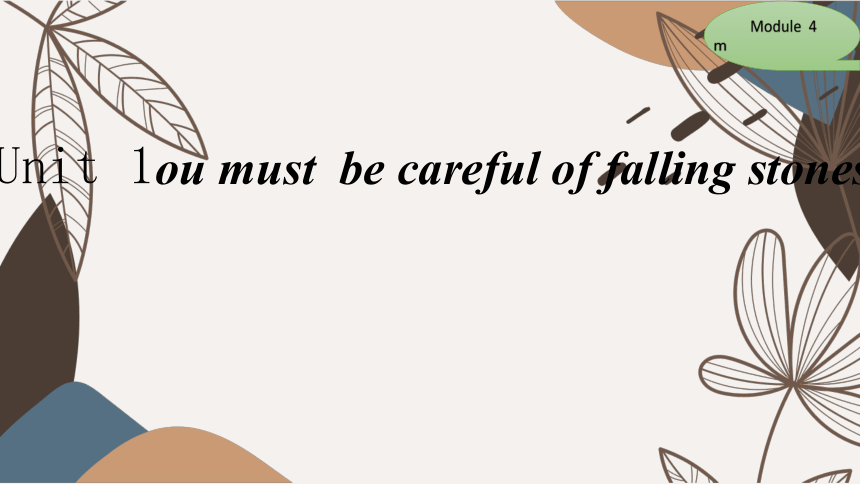
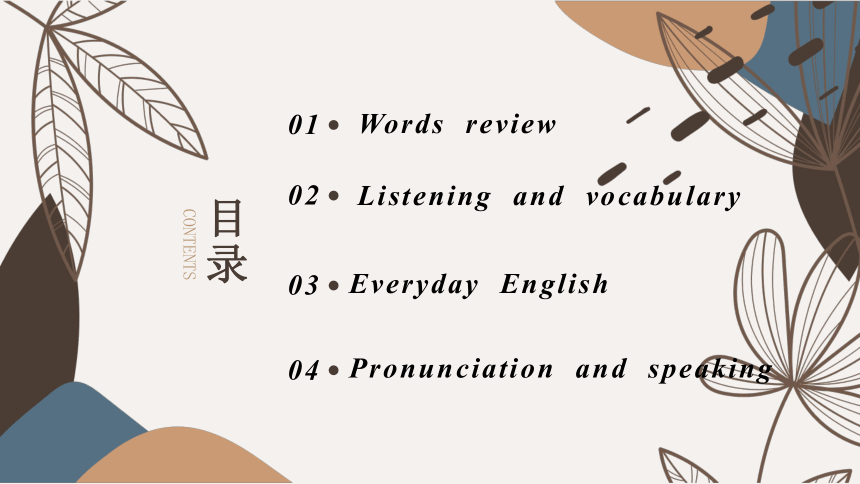
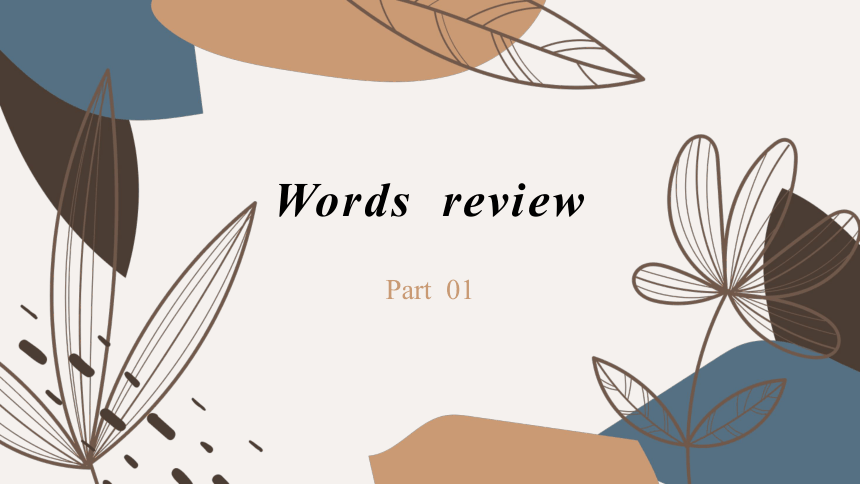
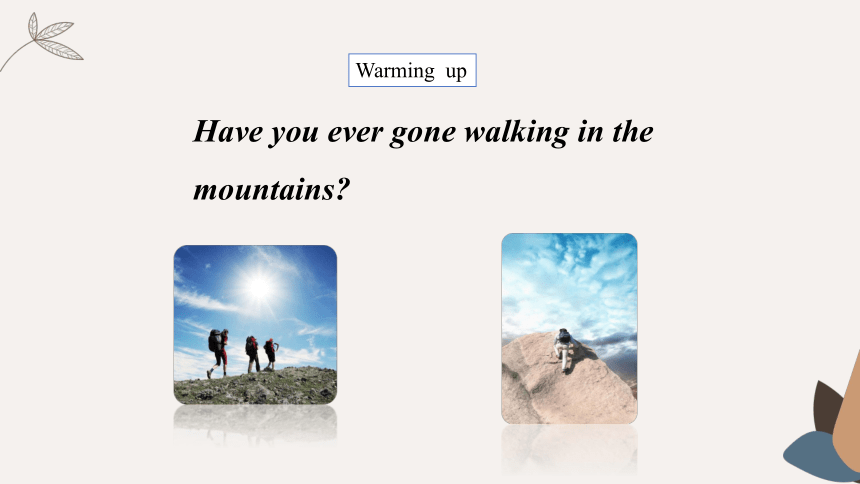

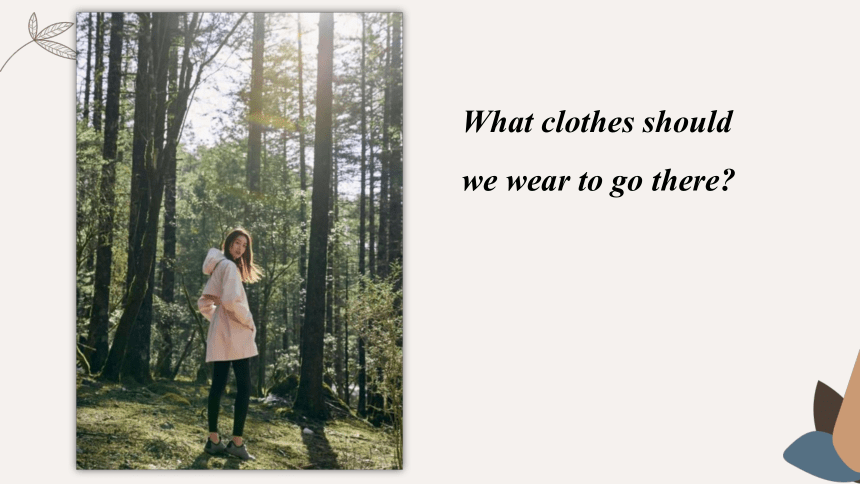

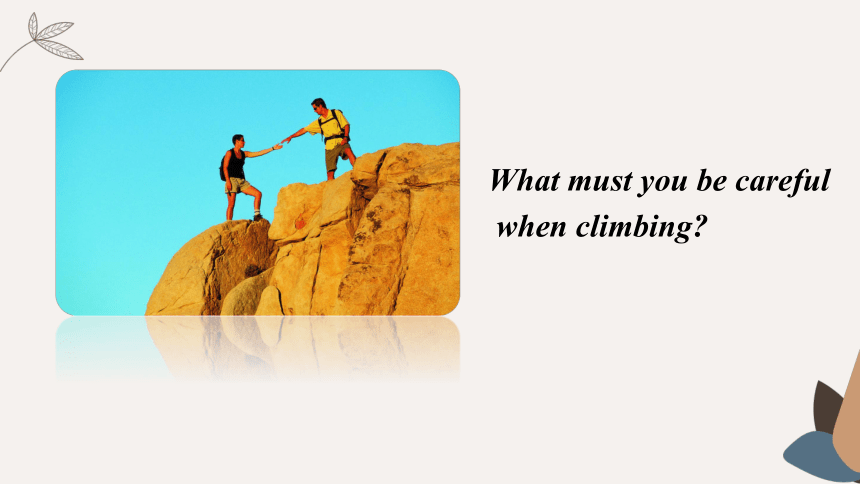
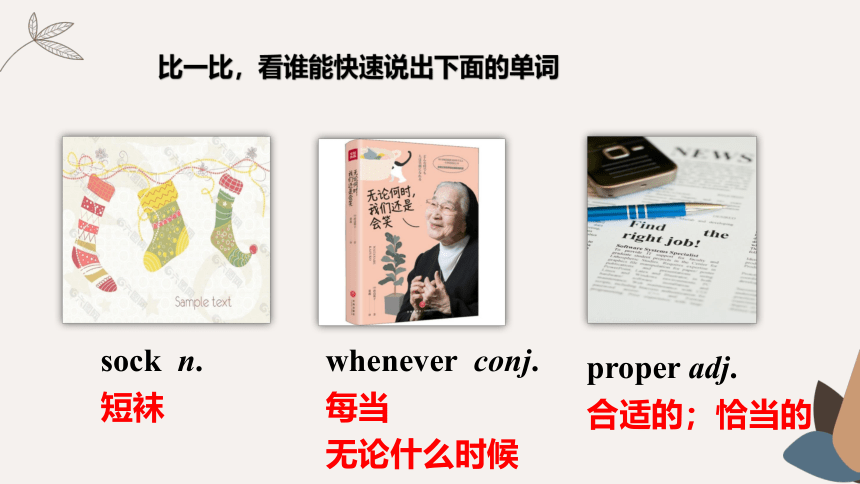
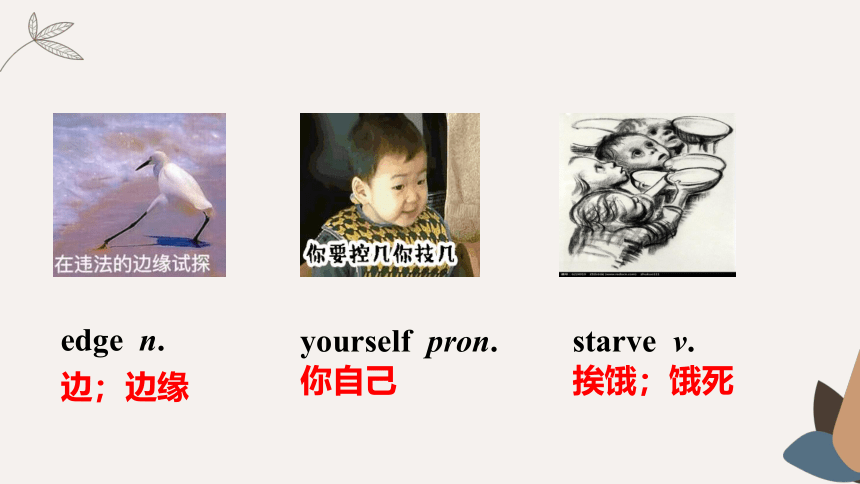
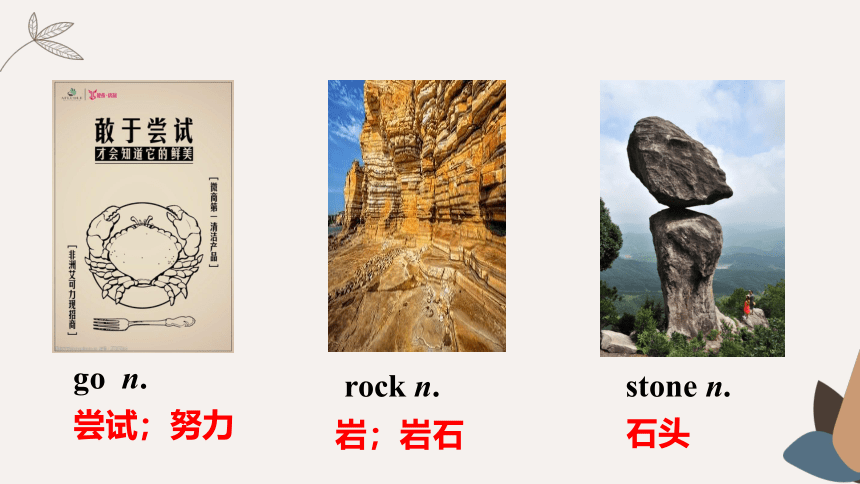
文档简介
(共63张PPT)
2022年春外研版英语
九年级下册英语精品课件
Unit 1ou must be careful of falling stones
Module 4
m
Words review
01
02
Everyday English
03
Pronunciation and speaking
04
目录
CONTENTS
Listening and vocabulary
Words review
Part 01
Warming up
Have you ever gone walking in the mountains
What shoes should we wear to go there
What clothes should
we wear to go there
What food will you take for the trip
What must you be careful
when climbing
比一比,看谁能快速说出下面的单词
sock n.
短袜
whenever conj.
每当
无论什么时候
proper adj.
合适的;恰当的
edge n.
边;边缘
yourself pron.
你自己
starve v.
挨饿;饿死
go n.
尝试;努力
rock n.
岩;岩石
stone n.
石头
fairly adv.
相当;还算
smooth adj.
无困难的;顺利的;光滑的;平坦的
straight adj.
直的;笔直的
比一比,看谁能快速说出下面的短语。
set off
动身;出发
go off
离开
in one go
一口气;一下子
rock climbing
攀岩
Listening and vocabulary
Part 02
1. Look at the photo. Then say what suggestions you can give to people who go walking in the mountains.
2. Listen and answer the questions.
1. When is Betty leaving for the trip
Betty is leaving an early tomorrow morning.
2. What is Mr Jackson going to tell the
students
Mr Jackson is going to tell everything about personal safety.
3. What does Betty’s mum suggest Betty
should not do
Betty’s mum suggests Betty not to drink the water from the stream. And don’t walk to close to the sides of hill path.
4. Does Betty think the trip will be
dangerous
No, she doesn't.
3. Listen and answer the questions.
When does Mr Jackson tell all
students a few rules and suggestions
Before they set off.
2. Did Daming have breakfast an hour
ago
Yes, he did.
Read the passage and answer the following questions.
1. Who lead the students to set off
Mr Jackson.
2. What should they wear
They should always wear proper clothes.
Now choose the correct answer.
1. Mr Jackson gives a lot of rules and
suggestions, so he probably _______.
a) is happy about walking in the hills
b) has never been to the hills
c) has a lot of experience of walking in
the hills
2. The children might hurt themselves
if they ___.
a) walk along the edge of the hill path
b) wear proper clothes
c) drink all their water before lunch
3. Before they have lunch, they
_______.
a) have to get up to the top
b) can have something to eat
c) can go rock climbing
Learning to learn
When you give suggestions, you may use can, must, have to, should, mustn’t and shouldn’t, depending on the strength of your advice.
4. Make notes about Mr Jackson’s
rules and suggestions.
You should _________________________.
You mustn’t ________________________
___________________________________.
You have to ________________________.
You mustn’t ________________________.
always wear proper clothes
walk too close to the edge of
the hill pass
keep together
go off on your own
You can’t ________________________.
Don’t ___________________________.
You can’t ________________________.
You must ________________________.
have anything to eat now
drink all your water in one go
go rock climbing
be careful of falling stones
5. Complete the passage with the
correct form of the words in the box.
smooth stone straight thick whenever
(1) _________ you walk in the hills, you must wear strong shoes and (2)______ socks.
Whenever
thick
The walk may be fairly (3) ________ at the start because the path is (4) ________, but later it may get difficult. You should also be careful of (5) ______ falling from above.
smooth
straight
stone
Everyday English
Part 03
Please pay attention for a moment!
I’m starving!
Language points
1. OK, please pay attention for a moment!
好,请注意一下!
pay attention是一个固定短语,意为“注意;留心”,后面接名词或v.-ing形式作宾语时要借助介词to,即“pay attention to+n. / v.-ing形式”。
e.g. Mother always pays attention to my health.
妈妈总是很注意我的健康。
Please pay attention to him. He
doesn’t look well.
请注意他,他看起来不太好。
Now I pay attention to improving
my spoken English.
我现在注意提高我的英语口语。
2. Before we set off, there are a few rules and suggestions for you.
我们出发前有许多规则和建议给你。
set off 表示 “动身,出发”。
e.g. We’ll pack our clothes before setting off.
出发前,我们要打包好行李。
含有off的短语
break off 突然中止;中断
go off 发出响声;离开
turn off 关掉
run off 跑掉;迅速离开
put off 推迟
take off 脱掉;起飞
3. OK, whenever you go walking in the
hills, you should always wear proper
clothes.
你无论何时登山,都应该穿上合适的
衣服。
whenever conj. 表示“无论何时”,等于
no matter when。
类似的词有:whatever意为“无论什么”,whoever意为“无论谁”,wherever意为“无论在哪里”,however意为“无论怎样”。它们等同于“no matter + wh ”结构。
e.g. You can ask me for help whenever
you are in trouble. = You can ask me for help no matter when you are in trouble. 无论你何时有麻烦,你都可以要求我帮助。
proper表示“合适的,恰当的”,是形容词。
e.g. You need to put yourself in a proper
place.
你要把自己放在一个合适的位置。
4. Now, you mustn’t walk too close to the edge of the hill path because you might fall and hurt yourselves.
现在你不要走近这个山的边缘,因为你可能会掉下去或伤害到你自己。
the edge of …表示“……的边缘”。
yourselves是反身代词,表示“你们自己”。
e.g. I realized I was on the edge of the
mountain.
我意识到我是在这座山的边缘。
Just make yourself at home.
别拘束。
5. You mustn’t go off on your own.
你必须自己离开。
go off表示“离开”,相当于leave。
on one’s own表示“某人自己,独自”。
等于by oneself。
e.g. We should finish our homework
on our own.
我们应该自己完成作业。
6. I’m starving!
我都快饿死了!
口语中,人们常用starving 表示“非常饿”。
e.g. What’s for lunch I’m starving!
午饭吃什么?我快饿死了!
7. Don’t drink all your water in one go.
不要一下子喝完你所有的水。
in one go表示“一口气,一下子”。
e.g. He ate up the moon cake in one go.
他一口气吃光了月饼。
8. Come on! I’ll lead the way.
走吧!我来带路。
come on在不同的情景中有不同的含义。
e.g. Come on—we’re going to be late if
you don’t hurry. (表示“快一点”)
快点儿—你不快点儿我们就要迟
到了。
--It’ll take at least two hours to do this!
--Oh, come on! I could do it in twenty
minutes.
--至少要花两小时才能干完!
--噢,得了吧!我20分钟就能干完。
(表示不相信,“得了吧”)
含有come的短语
come on 赶快
come up 发生
come in 进来
come out 出版
come up with 想出(主意),找出(答案)
lead表示“带 (路),领 (路)”。
e.g. I don’t know the way, so you’d
better lead.
我不认识路,所以你最好带路。
9. It should be a fairly smooth walk to
begin with because it’s a straight path.
开始走的还算是相当顺利的,因为它
是一条笔直的路。
fairly表示“相当,还算”。是副词。
e.g. He studies English fairly well, so
we should learn from him.
他英语学得相当好,因此我们应
该向他学习。
smooth表示 “无困难的,光滑的”,形容词。
e.g. The stone feels smooth.
石头摸起来很光滑。
straight表示“直的,笔直的”,形容词。
e.g. The street that is built last month
is straight and wide.
上个月建成的街道直而宽。
Pronunciation and speaking
Part 04
6. Read and predict how the speaker is
likely to link the words.
Whenever you go walking in the hills, you should always wear proper clothes. Now, you mustn’t walk too close to the edge of the hill path because you might fall and hurt yourselves.
Now listen and check.
Whenever you go walking in the hills, you should always wear proper clothes. Now, you mustn’t walk too close to the edge of the hill path because you might fall and hurt yourselves.
7. Read the paragraph in Activity
6 aloud.
8. Work in pairs. Talk about a trip to:
the beach
the mountains
the countryside
the theatre
Now give rules and suggestions.
练一练
1. We will ______ tomorrow morning.
A. set off B. put off
C. start off D. begin off
2. _____ you go, they will give you a
warm welcome.
A. Whenever B. no matter how
C. Wherever D. However
3. You is old enough to look _____ and
make own decisions.
A. your B. yourself
C. yourselves
4. The students went ____ one by one
after school.
A. up B. from
C. with D. off
中考链接
1. Look at the “No parking” sign. You
____ park your car here.
A. should B. must
C. needn’t D. mustn’t
2. We ______ pay to get into the concert.
It’s free.
A. can’t
B. mustn’t
C. might not
D. don’t have to
3. -May I take this magazine out of the
reading room
-No, you _______. You read it in here.
A. mightn’t B. won’t
C. needn’t D. mustn’t
4. -______ you leave now You only
arrived here an hour ago.
-Sorry, but so much homework is
waiting for me.
A. May B. Must
C. Can D. Might
Homework
如果如果你的学校下周要组织
一次去海边的郊游,请写出有关
郊游的规则和建议。要注意情态
动词的使用。60词左右。
https://www.21cnjy.com/help/help_extract.php
2022年春外研版英语
九年级下册英语精品课件
Unit 1ou must be careful of falling stones
Module 4
m
Words review
01
02
Everyday English
03
Pronunciation and speaking
04
目录
CONTENTS
Listening and vocabulary
Words review
Part 01
Warming up
Have you ever gone walking in the mountains
What shoes should we wear to go there
What clothes should
we wear to go there
What food will you take for the trip
What must you be careful
when climbing
比一比,看谁能快速说出下面的单词
sock n.
短袜
whenever conj.
每当
无论什么时候
proper adj.
合适的;恰当的
edge n.
边;边缘
yourself pron.
你自己
starve v.
挨饿;饿死
go n.
尝试;努力
rock n.
岩;岩石
stone n.
石头
fairly adv.
相当;还算
smooth adj.
无困难的;顺利的;光滑的;平坦的
straight adj.
直的;笔直的
比一比,看谁能快速说出下面的短语。
set off
动身;出发
go off
离开
in one go
一口气;一下子
rock climbing
攀岩
Listening and vocabulary
Part 02
1. Look at the photo. Then say what suggestions you can give to people who go walking in the mountains.
2. Listen and answer the questions.
1. When is Betty leaving for the trip
Betty is leaving an early tomorrow morning.
2. What is Mr Jackson going to tell the
students
Mr Jackson is going to tell everything about personal safety.
3. What does Betty’s mum suggest Betty
should not do
Betty’s mum suggests Betty not to drink the water from the stream. And don’t walk to close to the sides of hill path.
4. Does Betty think the trip will be
dangerous
No, she doesn't.
3. Listen and answer the questions.
When does Mr Jackson tell all
students a few rules and suggestions
Before they set off.
2. Did Daming have breakfast an hour
ago
Yes, he did.
Read the passage and answer the following questions.
1. Who lead the students to set off
Mr Jackson.
2. What should they wear
They should always wear proper clothes.
Now choose the correct answer.
1. Mr Jackson gives a lot of rules and
suggestions, so he probably _______.
a) is happy about walking in the hills
b) has never been to the hills
c) has a lot of experience of walking in
the hills
2. The children might hurt themselves
if they ___.
a) walk along the edge of the hill path
b) wear proper clothes
c) drink all their water before lunch
3. Before they have lunch, they
_______.
a) have to get up to the top
b) can have something to eat
c) can go rock climbing
Learning to learn
When you give suggestions, you may use can, must, have to, should, mustn’t and shouldn’t, depending on the strength of your advice.
4. Make notes about Mr Jackson’s
rules and suggestions.
You should _________________________.
You mustn’t ________________________
___________________________________.
You have to ________________________.
You mustn’t ________________________.
always wear proper clothes
walk too close to the edge of
the hill pass
keep together
go off on your own
You can’t ________________________.
Don’t ___________________________.
You can’t ________________________.
You must ________________________.
have anything to eat now
drink all your water in one go
go rock climbing
be careful of falling stones
5. Complete the passage with the
correct form of the words in the box.
smooth stone straight thick whenever
(1) _________ you walk in the hills, you must wear strong shoes and (2)______ socks.
Whenever
thick
The walk may be fairly (3) ________ at the start because the path is (4) ________, but later it may get difficult. You should also be careful of (5) ______ falling from above.
smooth
straight
stone
Everyday English
Part 03
Please pay attention for a moment!
I’m starving!
Language points
1. OK, please pay attention for a moment!
好,请注意一下!
pay attention是一个固定短语,意为“注意;留心”,后面接名词或v.-ing形式作宾语时要借助介词to,即“pay attention to+n. / v.-ing形式”。
e.g. Mother always pays attention to my health.
妈妈总是很注意我的健康。
Please pay attention to him. He
doesn’t look well.
请注意他,他看起来不太好。
Now I pay attention to improving
my spoken English.
我现在注意提高我的英语口语。
2. Before we set off, there are a few rules and suggestions for you.
我们出发前有许多规则和建议给你。
set off 表示 “动身,出发”。
e.g. We’ll pack our clothes before setting off.
出发前,我们要打包好行李。
含有off的短语
break off 突然中止;中断
go off 发出响声;离开
turn off 关掉
run off 跑掉;迅速离开
put off 推迟
take off 脱掉;起飞
3. OK, whenever you go walking in the
hills, you should always wear proper
clothes.
你无论何时登山,都应该穿上合适的
衣服。
whenever conj. 表示“无论何时”,等于
no matter when。
类似的词有:whatever意为“无论什么”,whoever意为“无论谁”,wherever意为“无论在哪里”,however意为“无论怎样”。它们等同于“no matter + wh ”结构。
e.g. You can ask me for help whenever
you are in trouble. = You can ask me for help no matter when you are in trouble. 无论你何时有麻烦,你都可以要求我帮助。
proper表示“合适的,恰当的”,是形容词。
e.g. You need to put yourself in a proper
place.
你要把自己放在一个合适的位置。
4. Now, you mustn’t walk too close to the edge of the hill path because you might fall and hurt yourselves.
现在你不要走近这个山的边缘,因为你可能会掉下去或伤害到你自己。
the edge of …表示“……的边缘”。
yourselves是反身代词,表示“你们自己”。
e.g. I realized I was on the edge of the
mountain.
我意识到我是在这座山的边缘。
Just make yourself at home.
别拘束。
5. You mustn’t go off on your own.
你必须自己离开。
go off表示“离开”,相当于leave。
on one’s own表示“某人自己,独自”。
等于by oneself。
e.g. We should finish our homework
on our own.
我们应该自己完成作业。
6. I’m starving!
我都快饿死了!
口语中,人们常用starving 表示“非常饿”。
e.g. What’s for lunch I’m starving!
午饭吃什么?我快饿死了!
7. Don’t drink all your water in one go.
不要一下子喝完你所有的水。
in one go表示“一口气,一下子”。
e.g. He ate up the moon cake in one go.
他一口气吃光了月饼。
8. Come on! I’ll lead the way.
走吧!我来带路。
come on在不同的情景中有不同的含义。
e.g. Come on—we’re going to be late if
you don’t hurry. (表示“快一点”)
快点儿—你不快点儿我们就要迟
到了。
--It’ll take at least two hours to do this!
--Oh, come on! I could do it in twenty
minutes.
--至少要花两小时才能干完!
--噢,得了吧!我20分钟就能干完。
(表示不相信,“得了吧”)
含有come的短语
come on 赶快
come up 发生
come in 进来
come out 出版
come up with 想出(主意),找出(答案)
lead表示“带 (路),领 (路)”。
e.g. I don’t know the way, so you’d
better lead.
我不认识路,所以你最好带路。
9. It should be a fairly smooth walk to
begin with because it’s a straight path.
开始走的还算是相当顺利的,因为它
是一条笔直的路。
fairly表示“相当,还算”。是副词。
e.g. He studies English fairly well, so
we should learn from him.
他英语学得相当好,因此我们应
该向他学习。
smooth表示 “无困难的,光滑的”,形容词。
e.g. The stone feels smooth.
石头摸起来很光滑。
straight表示“直的,笔直的”,形容词。
e.g. The street that is built last month
is straight and wide.
上个月建成的街道直而宽。
Pronunciation and speaking
Part 04
6. Read and predict how the speaker is
likely to link the words.
Whenever you go walking in the hills, you should always wear proper clothes. Now, you mustn’t walk too close to the edge of the hill path because you might fall and hurt yourselves.
Now listen and check.
Whenever you go walking in the hills, you should always wear proper clothes. Now, you mustn’t walk too close to the edge of the hill path because you might fall and hurt yourselves.
7. Read the paragraph in Activity
6 aloud.
8. Work in pairs. Talk about a trip to:
the beach
the mountains
the countryside
the theatre
Now give rules and suggestions.
练一练
1. We will ______ tomorrow morning.
A. set off B. put off
C. start off D. begin off
2. _____ you go, they will give you a
warm welcome.
A. Whenever B. no matter how
C. Wherever D. However
3. You is old enough to look _____ and
make own decisions.
A. your B. yourself
C. yourselves
4. The students went ____ one by one
after school.
A. up B. from
C. with D. off
中考链接
1. Look at the “No parking” sign. You
____ park your car here.
A. should B. must
C. needn’t D. mustn’t
2. We ______ pay to get into the concert.
It’s free.
A. can’t
B. mustn’t
C. might not
D. don’t have to
3. -May I take this magazine out of the
reading room
-No, you _______. You read it in here.
A. mightn’t B. won’t
C. needn’t D. mustn’t
4. -______ you leave now You only
arrived here an hour ago.
-Sorry, but so much homework is
waiting for me.
A. May B. Must
C. Can D. Might
Homework
如果如果你的学校下周要组织
一次去海边的郊游,请写出有关
郊游的规则和建议。要注意情态
动词的使用。60词左右。
https://www.21cnjy.com/help/help_extract.php
同课章节目录
- Module 1 Travel
- Unit 1 We toured the city by bus and by taxi
- Unit 2 It's a long story.
- Unit 3 Language in use
- Module 2 Education
- Unit 1 They don't sit in rows.
- Unit 2 What do I like best about school?
- Unit 3 Language in use
- Module 3 Life now and then
- Unit 1 They sometimes work harder.
- Unit 2 I think life is better today.
- Unit 3 Language in use.
- Module 4 Rules and suggestions
- Unit 1 You must be careful of falling stones.
- Unit 2 we must keep the camp clean.
- Unit 3 Language in use.
- Revison A
- Module 5 Look after yourself
- Unit 1 We'd better get you to hospital.
- Unit 2 Get off the sofa!
- Unit 3 Language in use.
- Module 6 Eating togethe
- Unit 1 When is the school-leavers' party?
- Unit 2 Knives and forks are used for most Western
- Unit 3 Language in use
- Module 7 English for you and me
- Unit 1 Have you ever been to an English corner?
- Unit 2 We all own English.
- Unit 3 Language in use
- Module 8 My future life
- Unit 1 Here's to our friendship and the future
- Unit 2 I know that you will be better at maths.
- Unit 3 Language in use
- Revison B
